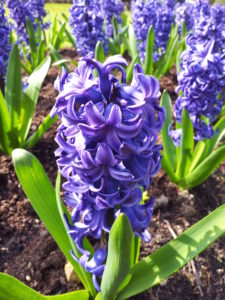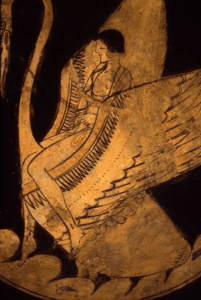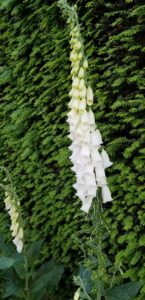
Hyacinths at Anglesey abbey. Photograph attribution, the wub
A Northanger Abbey story, and the myth of Hyacinthus
It was an awkward morning in Milsom-Street. It had been arranged that the Allens would deliver Catherine from their Bath lodgings to General Tilney’s superior ones, in time to join the family for breakfast, and then make ready for the journey to Northanger Abbey. This departure the General insisted would take place at ten o’clock and not a moment later.
For all her enchantment with young Mr. Henry Tilney and his sister Eleanor, the morning was an uncomfortable one with Catherine. The General seemed to fill the breakfast-room with his imperious manner and incessant commands, alternating with many over-unctuous and ingratiating speeches that were, alarmingly, directed at herself. She would have preferred had he ignored her, but he insisted on particularly recommending every item on the lavish breakfast-table to her, and explaining their excellence. “Our butter, you know, we brought from Northanger; no town-bought butter for us. One taste, and I am sure that with your discernment, you will agree. Do have some – more than that, surely! – upon your muffins. Our very best cook always accompanies us on such journeys as these, and I hate to think at what hour he awakes, to produce such muffins, and such chops, and eggs. Of course he has no bother about the jams and jellies, as they are brought from Northanger as well. I endorse the blackcurrent ones especially.”
Catherine, who had taken the quince, looked abashed.
“Oh! You prefer the quince. Well, well, you are a young lady of refinement, and the choicest of taste. Eleanor, make sure that quince jelly is on table at Northanger every morning while Miss Moreland is with us.”
So matters continued, with Catherine not daring to look at Henry nor Eleanor for embarrassment, while they seemed sadly constrained and uneasy during their father’s pronouncements. These were interrupted however for an even less pleasant cause: Henry’s brother, Captain Tilney came down late to breakfast, resulting in an especially lengthy outburst and harangue from the General, that seemed as if it would never cease.
At last the meal and the General’s speeches were done, and he rose importantly, announcing that he had to oversee the servants who were to bring the trunks down to the carriage. “Now all of you young people,” he ordered, fixing each in turn with an unnervingly harsh stare, “will be down stairs and in the hall on the stroke of ten. Remember that.”
“Indeed we will, Father,” Eleanor returned earnestly, “we are all packed already.”
“Very well. See that you are,” and he departed up-stairs.
There was a quiet but heartfelt sigh around the table, and Captain Tilney got up hastily. “I shall go back to my chamber until you are all well away,” he declared, “I have had enough of it for one morning, and am more than ever thankful not to be going with you.” His brother and sister made no answer.
“I had better see about my horse,” said Henry, in tones that fell on Catherine’s ears gently after those of his father’s and brother’s. “Eleanor, I hope you and Miss Moreland can have a little quiet time. It is not yet nine.”
“We will, Henry,” she reassured him with a smile. “I am only going to water and rearrange the plants before we go, and Catherine may like to help me.”
“A suitable occupation for two young ladies,” he smiled back. “I hope you like it, Miss Moreland; it is a peaceful one at any rate.”
“I have no objection to peace,” she answered, “but for a young lady, I am not very proficient about flowers.”
“Are you not?” said Eleanor in surprise, as Henry went out. “Do you not do gardening at home?”
“Not if I can help it,” Catherine laughed.
“But you are not a sitting-down kind of young lady, I know – you are a great walker!”
“Oh yes, I do love good fast walking above all things, and being out in the fresh open air. I hate being confined. Fussing about and waiting for plants to grow never appealed to me.”
“But do you not like the flowers themselves when they appear? Do you not enjoy picking flowers?”
“Not for themselves very much. I never can tell one apart from the next, and to say the truth, as a naughty little girl I always seemed to pick the ones I ought not – adjurations to stay away from those particular ones, never made an impression!”
“Catherine, I do believe you may have been something of a tom-boy!”
“Why, yes, I suppose I was. I loved to play ball games and run races with my brothers. My mother was always in despair at how dirty I would get.”
“There is not much harm in that. Many a tom-boy has grown into a fine young lady, as indeed appears to have happened to you,” Eleanor assured her.
“Oh yes, my father and mother often tell me I am much improved!”
“But perhaps the love of flowers is the one gift that still needs developing.”
“Well, perhaps – if you think so,” Catherine answered doubtfully.
“Yes, I am certain of it. Shall you mind if I give you a lesson?”
“I would not mind anything from you, and should take a lesson gratefully, Eleanor.”
“Very well then. Do you see those flowers over there?”
A row of exquisitely perfect hyacinth plants in white china tubs sat on the wide window-sill. Some were purple, some pink, some white. Even Catherine, turning to look, caught her breath in delight.

Hyacinths white. Photo credit Elena Schifernet
“Oh yes! What fine ones. I have never seen any such flowers as that. What are they?”
“Why, those are hyacinths. Now tell me, would you be inclined to snatch them if they were in your mother’s garden and she told you not to take them?”
“I would probably want them most of any, they are so beautiful,” Catherine confessed. “But I do not know why I have never noticed hyacinths before. You must have the talent for growing especially nice ones.”
“Now that you have seen them, come nearer, and examine them more carefully.”
The girls approached the flowers, and Eleanor cupped a white one in her hand. “Do you see how wonderfully they are structured? Look closely. They are a bulb flower you know, related to the asparagus, and you see there are six leaves, in a cluster. Each stalk has a bract, as it is called, of these leaves. Do you see how intricately it is made?”
“Oh yes,” Catherine breathed. “I never really happened to look at one before, this near. And oh, the scent! It fills the whole room!”
“Is it not glorious? They are among the most odorous of flowers, and seem to breathe of spring, do not they?”
“They hardly look real! Are they difficult to grow? I am sure I never could.”
“Not at all. The bulbs blossom easily, and the extravagant flowering lasts for a little while in spring. I shall be sorry to miss the last of the flowering of these, but we have more at Northanger.”
“I think you carry them everywhere you go,” Catherine sighed.
“I wish I could! It is a sweet thought. And another thing to think about is the hyacinth’s associations in legend.”
“Oh! There is a story about them? Do tell! I love stories.”
“I know you do! And this one is about the youth, Hyacinthus, in ancient Greece. He was a very beautiful Spartan prince, and loved the god Apollo. The winds Zephyr and Boreas loved Hyacinthus, too, and a musician called Thamyrus also sought him, but he chose to go with Apollo. They traveled through the skies together, a chariot drawn by swans.”
“Oh,” breathed Catherine, her eyes wide, “I never heard any thing more wonderful! A chariot of swans! How beautiful that sounds.”

Hyacinth Rides a Swan
“Does it not? But this is a sad story you know. The god and the young man had wonderful times; Apollo taught Hyacinthus to use the bow and the lyre, and to perform prophecy. One day they were playing at quoits, but Apollo, being so strong, cleaved the clouds with his quoit, and Hyacinthus ran to try to catch it. But as it bounced down, it hit his head, killing him.”
“Oh, no! Not Hyacinthus!”
“Indeed, yes.” Eleanor nodded. “Apollo was aghast, and broken-hearted. It was the wind Zephyr, jealous at Hyacinthus preferring Apollo, who blew the quoit off course, and aimed it to hit the youth.”
“How terrible!” Catherine considered for a moment. “Do you think this really happened?”
Eleanor laughed. “Who can say? But it is a very good story, is it not? And that is not the ending. Apollo tried to heal Hyacinthus, and gave him ambrosia, but to no avail. From his spilled blood, Apollo created the hyacinth flower, and on its petals inscribed the word “Alas.” Can you see them?”
Catherine examined the little crossed petals. “Why yes, I think I do. Those little crossed petals might be like an A, and an L.”
“The ancient Greeks considered them the most beautiful of flowers, and many people still do today.”
“I should think so,” said Catherine. “They certainly have the most interesting of stories! I shall never look at them indifferently again.”
“No, I am sure you will not! But there is still more to the story. Apollo did succeed in conferring immortality on Hyacinthus, and like the flower he flourishes in spring, sleeps in winter and is reborn. There are springtime fetes yet in his name in Greece, I believe; and it is pleasant to think of Apollo and Hyacinthus still sailing the skies in their swan chariot, is it not?”
“Oh Eleanor, what a wonderful story,” signed Eleanor. “Is there any more? What happened to the winds – were they punished? And that man, the musician who loved Hyacinth, what happened to him?”
“Well, the winds went on very much in their own way, as always,” Eleanor smiled. “No one can punish a wind, or take it to account. As for Thamyris, he had an interesting history as well. He was the son of the musician Philamon, a son of Apollo, and his mother was a nymph. He became so famous as a singer and player of the cithara, that the Thracians made him their king. Thamyris was of exceptional beauty, and boasted he could outsing the Muses.”
“He seems rather conceited,” observed Catherine. “I am glad Hyacinthus chose Apollo.”
“Perhaps he was. But he was horribly punished. When he lost a singing contest against the Muses, they slashed out his eyes and took away his ability to make music.”
“Oh, how perfectly dreadful! Eleanor, don’t you wonder…”
“Well?”
“How odd it was, in those days, when men and gods and winds could all love each other?”
“That is why it is so interesting to study the ancients and their history, and literature. We learn what people believed in and practiced, through the ages, and come to understand so much more.”
“But there is such terrible cruelty in these old stories. Poor Thamyris, I can’t bear to think what the Muses did to him.”
“Yes, but there is a lesson even to that. That the gods who give talents, can take them away, too.”
Catherine pondered. “Eleanor, please do tell me, how do you know these things?”
“Why, it’s all in the Iliad,” she answered mildly.
“But that is Greek. You don’t read Greek do you? Girls don’t. You must be a regular learned lady!”
“No, I only can read a few words of Greek. I am no scholar. But I am Henry’s sister you know,” she smiled archly, “and it is hard to keep from learning such things around him. It is an education.”
“I am afraid he cannot like me,” Catherine sighed, “I am so ignorant.”
“I am sure he does like you very much,” Eleanor reassured her. “And he loves to teach people things.”
Catherine brightened up. “But it is you, Eleanor, that has taught me to love a hyacinth,” she said simply.


 Photo attributions: The two pictures of hyacinths are taken from Wiki Media Commons, and properly attributed to their photographers. The picture of the ancient vase with the swan image is from the collection of the University of Mississippi, and open to reproduction. The three final flower pictures (not hyacinths, sorry, but foxgloves!), were taken by me on trips to England.
Photo attributions: The two pictures of hyacinths are taken from Wiki Media Commons, and properly attributed to their photographers. The picture of the ancient vase with the swan image is from the collection of the University of Mississippi, and open to reproduction. The three final flower pictures (not hyacinths, sorry, but foxgloves!), were taken by me on trips to England.

12 comments
Skip to comment form
What a charming tale (even if the Greek myths Eleanor told were as tragic as one might expect from Greek myths)! Like Catherine, I did not know the story of Hyacinth, so thank you for sharing!
Author
Thanks, Christina, I’m very glad you liked it! It’s a bit offbeat, but research leads you into strange places!
As a Greek, I double-thank you for sharing this story.
And it’s true: before Covid, there was a fete, a music festival called Υακίνθεια honoring Hyacinthus.
I’m not very much into flowers but this is a beautiful approach!
Author
Really glad you can confirm that the tradition of Hyacinth festivals continues! It is nice to have a Greek story, isn’t it, not that common in the Austen world. When you say you’re not much into flowers, perhaps you have something in common with Catherine, who was “naturally indifferent” to them! Thanks for commenting.
A wonderful story – Is “Love is Love” one of the lessons Eleanor refers to learning from study of the ancients?
Note – When Henry leaves Eleanor and Catherine – he calls Catherine “Miss Tilney.”
Author
Thank you very much, Mary, I’m glad you liked it! Yes, I suppose that’s what I meant, that Eleanor was learning “Love is Love.” But in what scene does Henry call Catherine Miss Tilney? I looked at the scene where he goes to Woodston to prepare a dinner for them, and didn’t see the error. Can’t think where else in the text it might be!
It is just after breakfast. Henry is leaving to “see about my horse.” Eleanor says she will just water and re-arrange the plants. Henry replies – “A suitable occupation for two young ladies,” he smiled back. “I hope you like it, Miss Tilney; …” As I do not see him calling his sister “Miss Tilney”, and it is Catherine who responds – I am assuming you meant “Miss Moreland.”
Author
Ah, so! Thanks, Mary, I will correct it. For some inexplicable reason I thought you meant JA had made such an error in the text! Yes, much likelier to be me! 🙂
Much enjoyed your story, Diana, especially the breakfast chez Tilney!
Author
Glad you liked it, Jan. It is always fun – of one sort or another – to breakfast with the Tilneys!
Ahhh, what a lovely story! This beckons me to the time I was deeply into Greek myths as a tween, and this beckoning has resumed since I started studying the Regency culture for the past couple of years. I also love how Catherine and Eleanor interacted so Miss Moreland could truly learn to live a flower. Thank you for sharing this excerpt.
Author
Hi Jen, thank you for the lovely comment! I’m so pleased you enjoyed the “Greek” theme, something a little different in the Austenesque, and so interesting to research. Jane Austen really leaves so much room for her followers to manipulate – such as wondering how the conversation between Catherine and Eleanor might have worked out. So nice when somebody enjoys what I enjoy! 🙂